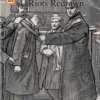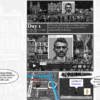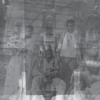Seminar Blogs

“History as Art, or Vice-Versa” – Bernice Ong
Mike Pearson, Professor Emeritus of Performance Studies at Aberystwyth University and Researcher for the Cardiff Race Riots series, walks us back to 1919 in the seminar session on 16 Dec 2020, through a ‘live’ reading of the reconstructed event with accompanying slides of old Butetown and character mugshots. Historically, the neighborhood was known to have…
Read more
“In Search of Lost Places (and Their Histories): Situating and Performing the 1919 Cardiff Race Riots with a Digital Graphic Novel” – Danny Steur
How are histories usually told? Though I am no student of history, I would say this most commonly occurs by chronicling the actions of history’s greatest persons: their remarkable, heroic undertakings, or maybe rather their horrendous activities. Naturally, a wide variety of forms of conveying histories exist, but a remarkable practice that I was unfamiliar…
Read more
“Retelling of History through Performance” – Elena Roznovan
Through images and dramaturgy of text, Mike Pearson transports the audience’s imagination to the events of the Cardiff Race Riots of 1919. He describes in detail what transpired on the consecutive days of the riot, between June 11 and June 14, 1919. In Pearson’s historical reconstruction based on a local historian’s account and numerous newspaper…
Read more
“Cardiff 1919 Riots Redrawn: Morphing Newspapers into Lively Knowledge” – Eleonora Stacchioti
In the last session organized by the research group Transmission in Motion, we had the pleasure to delve into the work of Mike Pearson, Professor in Performance Studies at Aberystwyth University and brilliant theatre maker. He presented Cardiff 1919, Riots Redrawn, a graphic novel by artist Kyle Legall, which results to be a narrative depiction…
Read more
“Retraced, Redrawn, Retold” – Floor Mijland
With his steady narration, Mike Pearson (Professor Emeritus of Performance Studies at Aberystwyth University) transports us back in time, to the streets of Cardiff in June 1919. Accompanied by images of street corners, houses, men, families, we are emerged in the mayhem that took place over the course of four days and nights. We hear…
Read more
“Cultural Forgetfulness” – Daniël Everts
In my recent academic endeavors, I have been focussing on memory on a cultural level. Primarily, I have been interested in the way some memories are given precedence over other memories in digital social media. However, when performance studies scholar Mike Pearson of Aberystwyth University spoke of his contribution in re-creating a particularly dark moment…
Read more
“Expanding and Enacting Historiographies” – Hannah Harder
A professor of performance studies, Mike Pearson developed the theater piece Wild Scenes at Cardiff in 2019, a dynamic performance of a local history. This project brings the audience through the four days of the Cardiff race riots, describing the broad movements of the events and the actors involved. Certainly a weighty task, Pearson describes…
Read more
“Performing the Forgotten Knowledge Through Digital Means” – Justina Jakubiec
The story of the riots that took place in Cardiff in 1919 leaves a lot to be desired. However cruel and prejudiced the affairs were, a recreation of the story turns out to be possible only on the basis of reports in local newspapers from that time. An aim to create a novel that would,…
Read more
“What Do We Need History For?” – Hymke Theunissen
On the 16th of December, I was not sitting in my living room and watching my laptop screen. I was not aware of the time or what I was going to make for dinner. Mentally, I was walking somewhere in Cardiff in 1919. I was surrounded by characters of a story formed by the voice…
Read more
“In Your Mind’s Eye: From Mike Pearson’s Retraced and Redrawn to True-Crime Podcasts” – Naomi Tidball
“The strands were very thin, this is partly due to date (100yrs ago), so the circumstances were difficult. The local historian of the town—who were victims of this riot—they have a very developed account of how the rioters came into the house. It is difficult to get the particulars of the accounts.” (Pearson 2020) From…
Read more
